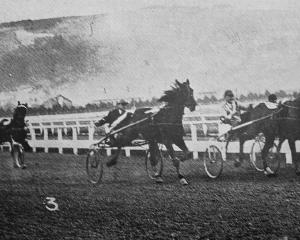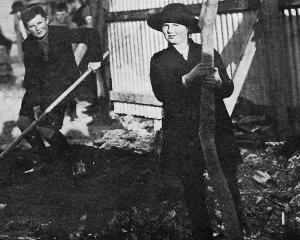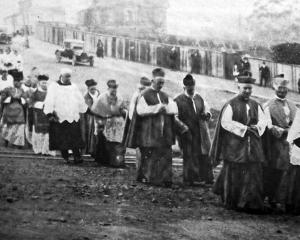The committee decided (says a correspondent of the Christchurch Press) to erect an alpine hut as the memorial, and chose the Haast Ridge as the most suitable place.
The hut will not only facilitate the climbing of Mount Cook, but also Silverhorne, Tasman, Lindenfelt, Haast, Haidinger, and the Glacier Dome.
The hut was built in Dunedin, of the lightest wood obtainable, taken to pieces, numbered, and transferred to the Hermitage.
The material was then carted to Blue Lake, and from there packed on horses to the Ball Hut.
From this point the whole work has to be done entirely by human effort. There was some difficulty in finding a man with sufficient skill, knowledge, and pluck to take charge of this arduous work, but fortunately Mr J. K. Smith was persuaded to undertake it.
Mr Smith has had much previous experience in such work, having built the Malte Brun and the Ball Huts.
He was able to secure a gang of men of his own type, who, it is hoped, will be enabled to finish the hut during this season.
It is the highest hut in Australasia, being situated at an altitude of 7000ft.
■Cause for earnest reflection is afforded those eligible young men who, through sheer indifference of abject cowardice, do not see fit to be up and doing their meed of service for the Empire, in the commendable attitude adopted by Constable Eckford, of the local police force (says Friday's North Otago Times).
Constable Eckford is the fourth son of his family to don the khaki.
Twice previously Constable Eckford has applied to be allowed to leave for the front, but has been refused. His enlistment implies his resignation from the police force, and, earnestly desirous of serving with the colours, he has renounced his rights to superannuation and the benefits attaching to his service in the police force.
He has been passed as medically fit, and hopes to leave with the next quota.
Constable Eckford's three brothers, all married men, have seen service in France and Flanders.
Sergeant John Eckford, who is attached to the Flying Corps, participated in the battle of the Marne, and has been stationed at Ypres since last August.
Private Thomas Eckford fought with the Sutherland Highlanders in France and was invalided home through shock, and is now stationed at Edinburgh on Home Defence.
Private Robert Eckford, of the Scots Guards, has seen active service in the trenches, and for the past six months has been stationed at Armentieres.
■The Territorial of to-day evidently has no sympathy with the man who does not believe in military training on conscientious grounds.
Evidence of this statement was given during the recent Territorial camp at Rangiotu.
One of the party giving a concert at the camp one evening was a young man who had obtained exemption from military service on conscientious grounds, and whose case had excited some public feeling.
During the concert this man was recognised by some men of the 7th Regiment, who were enraged at his presence there.
The feeling spread until there were between 200 and 300 men itching to get at the conscientious objector, and it was only the exercise of military discipline that checked them.
One of the officers managed to get the man out of camp and well on the way to Longburn before his departure was noticed.
■An Oamaru boy, writing home, says (reports the Mail) that when he got three days' holiday from military activities he decided to spend them in ease in Cairo.
For long months he had dreamed of the luxury of a good bed and good meals, and he determined to thoroughly enjoy them.
The meals in a good hotel were feasts of delight, but the bed proved a delusion.
Its downy comfort was too much for him after months of hard sleeping, and it was only by throwing away the sheets and turning in on the mattress on the floor that he got to sleep in the early hours of the morning.
■A farmer has, with the object of demonstrating that things are not always what they seem, taken to the Tuapeka Times office a beautiful sheaf of oats which, on a casual look, would seem to indicate a very heavy yield.
A closer inspection, however, reveals the fact that it contains but a very small percentage of grain, the high winds experienced a week or two back having completely thrashed out the grain.
The informant assures the paper that the sheaf shown was a fair sample of several acres, that other settlers in the district have also suffered considerably by having their grain thrashed out by the winds, and that, so far as that district is concerned, the farmers' prospects as regards big grain yields and fat cheques are not quite so rosy as have been painted. - ODT, 22.3.1916.












